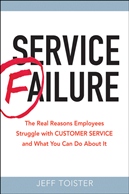What's your definition of employee engagement?
 Jeff Toister
Jeff Toister  Monday, April 23, 2012 at 1:08PM |
Monday, April 23, 2012 at 1:08PM |  Employee engagement is a hot topic. Engaged employees are more productive and loyal, while disengaged employees can hurt your company's bottom line. And, research shows that employee engagement and customer engagement are highly correlated.
Employee engagement is a hot topic. Engaged employees are more productive and loyal, while disengaged employees can hurt your company's bottom line. And, research shows that employee engagement and customer engagement are highly correlated.
You won't find much debate about the merits of employee engagement. However, you will see disagreement when it comes to finding a common definition of employee engagement. Which leads to my question:
What is employee engagement?
Here are three different definitions from respected sources:
Gallup
The Gallup Organization may be among the best known of the big consulting and research firms that focus on employee engagement. However, finding their definition takes a little bit of work. The best I could find was this: "Engaged employees are involved in and enthusiastic about their work." (Link to article reference.) There are many great resources on the Employee Engagement section of their website, but I couldn't find a definition.
BlessingWhite
Page 4 of the BlessingWhite 2011 Employee Engagement Report defines employee engagement as the intersection of job satisfaction and job contribution. (Download their free report here.) This seems to be an important distinction from the Gallup model which focuses more on employees' emotional connections to their work. The BlessingWhite model also takes into account employees' contributions to organizational success.
DecisionWise
Tracy Maylett, DecisionWise's CEO, co-authored an article on employee engagement with Julie Nielson, the American Society for Training and Development's (ASTD's) Senior Director of Human Resources and Organizational Learning. The article, titled "There Is No Cookie Cutter Approach to Engagement," appeared in the April 2012 issue of T&D Magazine and argued that employee engagement is the intersection of an employee's job satisfaction, effectiveness, and motivation. Their model seems like a hybrid of the Gallup and BlessingWhite approaches. Maylett and Nielson are hosting a free webinar on April 26 called "Halting the Engagement Exodus" where you can learn more. (Click here to register.)
Why does it matter?
This is by no means an exhaustive list, but there is a potential for confusion when we're all talking about engagement but we mean different things. Here's why I think this is important:
- No matter what the definition, research has shown that employee engagement is a critical driver of organizational success.
- If we want to improve something, we should gain agreement on what "it" is.
- Your definition will affect your strategy for getting better results.
My Definition, and a Resource
I prefer to think of employee engagement as the extent to which an employee is deliberately contributing to organizational success. This would be the "contribution" aspect of the BlessingWhite model or the "effectiveness" component of the DecisionWise model. I don't disagree that job satisfaction, motivation, and an emotional connection to the company are important, but I also view them as drivers of an employee's willingness to help their company succeed.
When I work with my own clients on employee engagement issues, I will often use a simple alignment assessment to start the conversation. This assessment looks at how well the organization's core "people processes" are aligned with organizational goals. The closer the alignment, the more likely you are to have engaged employees. Try the assessment out for yourself.
What's your definition?
Please comment on this post with your definition of employee engagement. Do you agree with one of the three mentioned above? Or, perhaps you have another twist you can share? Please share links if available!




Reader Comments (4)
Great post. I completely agree about the fact that people disagree. I think its worse than that though. I think if you ask 10 HR professionals what it is, they will each tell you with certainty what it is - thing is you'll get 10 different answers.
My humble view is that Employee Engagement isn't something you can do, it is something that happens if you create an environment for people to choose to engage more. The challenge therefore, that leaders have, is finding the things to do, that create the environment and relationships, where people will choose to become engaged.
You are probably right, Gordon. I might even be tempted to do a survey to see what wide range of responses are out there. As I type this, I'm 10 minutes into a webinar on employee engagement and no definition has been offered. It's simply assumed we all mean the same thing.
Great blog Jeff on a very timely topic. We are literally having to go back and "train" our field leadership on the concept and definition of engagement. Through a fairly extensive analysis process we found that we could not reasonably expect managers to know how to impact engagement if they could neither explain it or the actions that might lead to improving it.
In our quest to get to a common definition from which we could build learning, we also tapped into the resources you mentioned above. In the end the way we described engagement in this way: engaged employees know what their job is, how to do it, why they do it, and most importantly, they WANT to do it. By using this definition, we touch on role clarity, learning, and alignment to organizational vision. High engagement equals them wanting to do it.
A clear point of distinction is that we don't focus on effectivess or contribution of the work. We believe that these are the outcomes of highly engaged employees - not the definition of it.
Michelle - I think you make an important distinction between definition and desired outcomes. Blurring these two makes it harder to focus on getting great results.